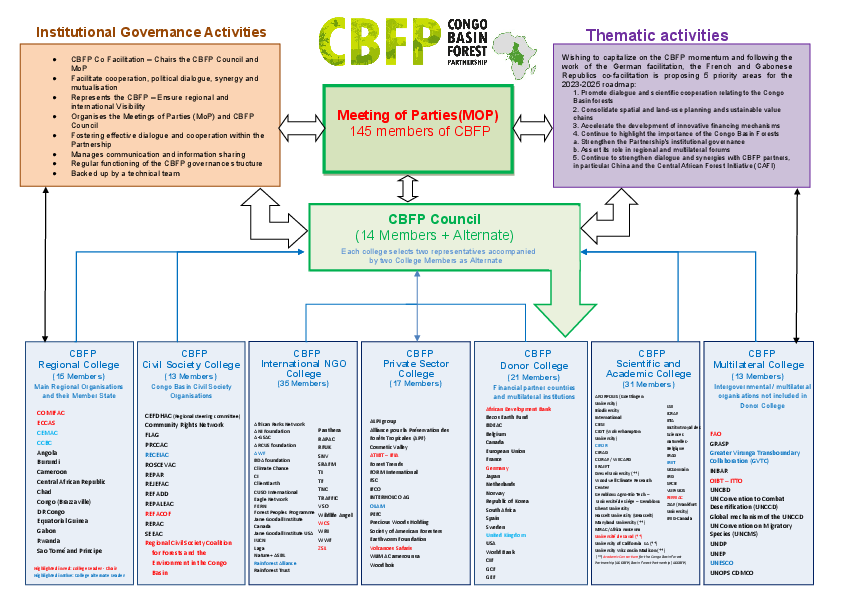CBFP Members
The partnership brings together the 11 member states of the COMIFAC, donor agencies, international organisations, NGOs, scientific institutions and private sector representatives. It counts over 145 members who share the commitment to enhance communication and coordination among them and to create synergies between their respective projects, programs and policies, in support of the COMIFAC convergence Plan.
What is the role of the CBFP colleges?
The colleges are introduced in order to allow each partner to express their views more easily than is possible at the annual Meetings of Parties and to ensure that channels for information-sharing are established and function as efficiently as possible. The colleges assemble CBFP partners of the same category and as such provide a forum where issues and concerns of common interest can be expressed and discussed.
Consideration inside the colleges constitutes the way through which individual CBFP partners can propose issues which they think should be discussed in the CBFP Council. Similarly, the colleges provide a mechanism for groups of partners to exchange views on the outcome of meetings of the CBFP Council and of the annual Meetings of CBFP Parties.
The colleges are designated on the basis of their composition as follows:
(15 Members) Main Regional Organisations and their Member State
COMIFAC
ECCAS
CEMAC
CCBC
Angola
Burundi
Cameroon
Central African Republic
Chad
Congo (Brazzaville)
DR Congo
Equatorial Guinea
Gabon
Rwanda
Sao Tomé and Principe
(13 Members) Congo Basin Civil Society Organisations
CEFDHAC (Regional steering committee)
Community Rights Network
FLAG
PRCCAC
RECEIAC
ROSCEVAC
REPAR
REJEFAC
REFADD
REPALEAC
REFACOF
RERAC
SEEAC
Regional Civil Society Coalition for Forests and the Environment in the Congo Basin
(35 Members)
African Parks Network
ANI Foundation
A-GSAC
ARCUS foundation
AWF
BDA foundation
Climate Chance
CI
ClientEarth
CUSO International
Eagle Network
FERN
Forest Peoples Programme
Jane Goodall Institute
Canada
Jane Goodall Institute USA
IUCN
Laga
Nature+ ASBL
Rainforest Alliance
Rainforest Trust
Panthera
RAPAC
RFUK
SNV
SRAFM
TI
TF
TNC
TRAFFIC
VSO
Wildlife Angel
WCS
WRI
WWF
ZSL
(17 Members)
ALPI group
Alliance pour la Préservation des
Forêts Tropicales (APF)
Cosmetic Valley
ATIBT – IFIA
Forest Trends
FORM International
FSC
IFCO
INTERHOLCO AG
OLAM
PEFC
Precious Woods Holding
Society of American Foresters
Earthworm Foundation
Volcanoes Safaris
WIJMA Cameroun sa
Woodbois
(21 Members) Financial partner countries and multilateral institutions
African Development Bank
Bezos Earth Fund
BDEAC
Belgium
Canada
European Union
France
Germany
Japan
Netherlands
Norway
Republic of Korea
South Africa
Spain
Sweden
United Kingdom
USA
World Bank
CIF
GCF
GEF
(31 Members)
AFORPOLIS (Goettingen University)
Biodiversity International
CBSI
CIDT (Wolverhampton University)
CIFOR
CIRAD
CORAF / WECARD
ERAIFT
Drexel University (**)
Woodwell Climate Research Center
Gembloux Agro-Bio Tech – Université de Liège – Gembloux
Ghent University
Hasselt University (UHasselt)
Maryland University (**)
MRAC/Africa museum
Université de Laval (**)
University of California LA (**)
University Wisconsin Madison (**)
LSE
ICRAF
IITA
Institut royal des Sciences naturelles - Belgique
IRAD
IRET
UCLouvain
IRD
SPCB
VLIR-UOS
RIFFEAC
ZIAF (Frankfurt University)
IFED-Canada
(**) Academic Consortium for the Congo Basin Forest Partnership (ACCBFP) Basin Forest Partnership (ACCBFP)
(13 Members) Intergovernmental / multilateral organisations not included in Donor College
FAO
GRASP
Greater Virunga Transboundary
Collaboration (GVTC)
INBAR
OIBT – ITTO
UNCBD
UN Convention to Combat
Desertification (UNCCD)
Global mechanism of the UNCCD
UN Convention on Migratory
Species (UNCMS)
UNDP
UNEP
UNESCO
UNOPS CDMCO

Share: